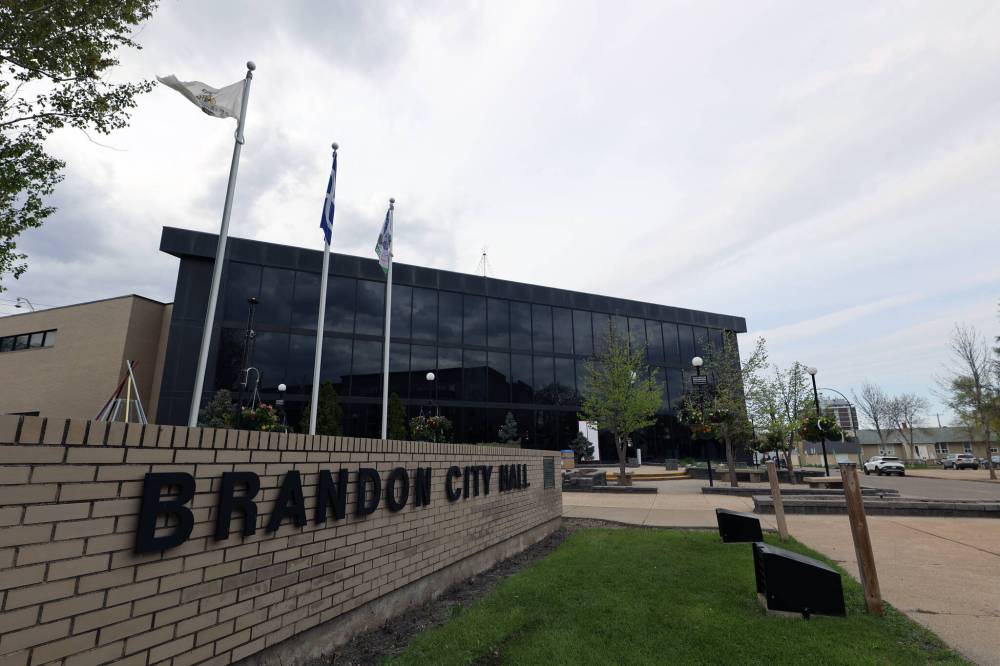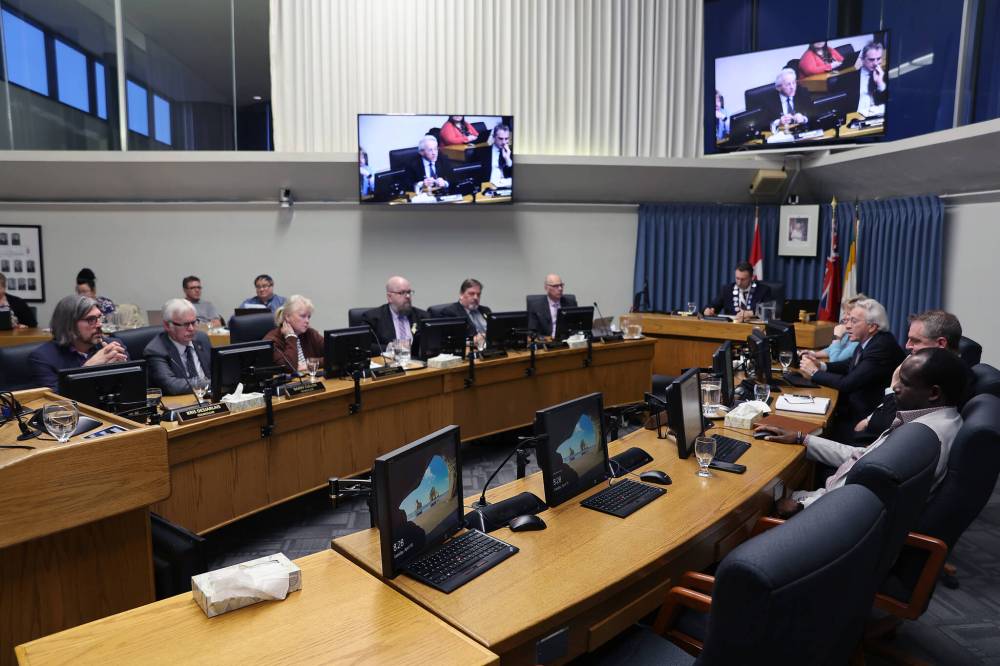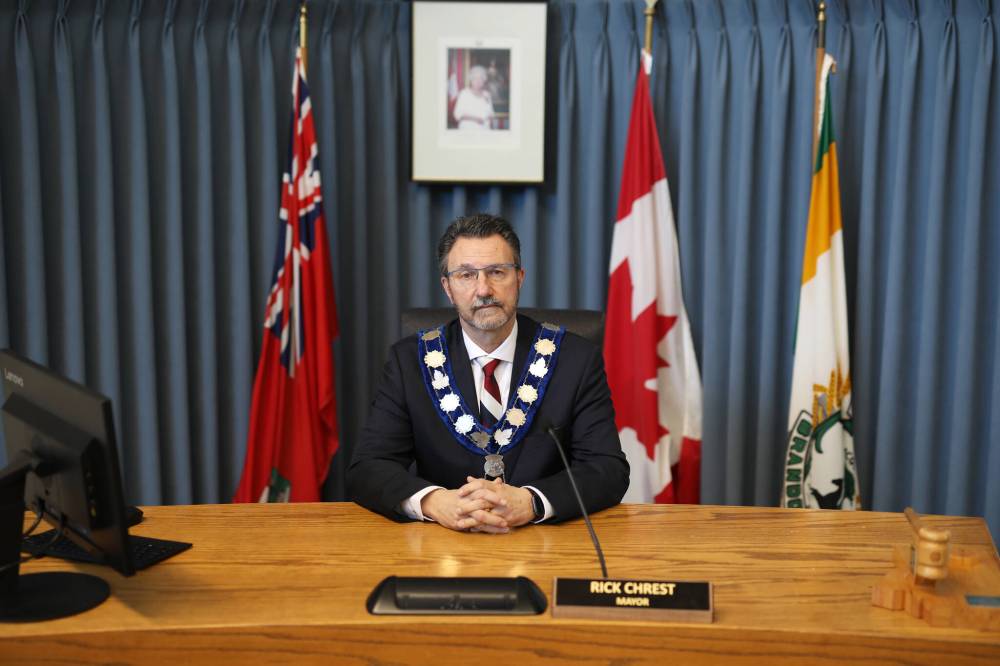Behind closed doors: Council’s informal meetings may violate the Municipal Act, expert says
Advertisement
Read this article for free:
or
Already have an account? Log in here »
We need your support!
Local journalism needs your support!
As we navigate through unprecedented times, our journalists are working harder than ever to bring you the latest local updates to keep you safe and informed.
Now, more than ever, we need your support.
Starting at $15.99 plus taxes every four weeks you can access your Brandon Sun online and full access to all content as it appears on our website.
Subscribe Nowor call circulation directly at (204) 727-0527.
Your pledge helps to ensure we provide the news that matters most to your community!
To continue reading, please subscribe:
Add Brandon Sun access to your Free Press subscription for only an additional
$1 for the first 4 weeks*
*Your next subscription payment will increase by $1.00 and you will be charged $20.00 plus GST for four weeks. After four weeks, your payment will increase to $24.00 plus GST every four weeks.
Read unlimited articles for free today:
or
Already have an account? Log in here »
Hey there, time traveller!
This article was published 27/05/2022 (1300 days ago), so information in it may no longer be current.
A University of Winnipeg professor specializing in municipal politics said he believes that Brandon City Council’s frequent practice of holding informal, off-the-record meetings outside of the regular schedule likely violates Manitoba’s Municipal Act.
Between Oct. 25, 2018, and April 30, 2022, city council met 206 times but only about half of those meetings were in the public eye.
“The legislation is very clear that these sessions have to happen in public and there have to be recorded minutes,” said Aaron Moore, a U of W political science professor whose research focuses on urban politics and public policy.

Earlier this year, the Sun filed a freedom of information and protection of privacy request with Brandon City Council asking for the dates of every regular, special and informal meeting it held from the day after the last municipal elections in Manitoba to the end of April 2022.
The document received after making that request shows that council hosts more informal, off-the-record meetings than it does regularly scheduled, public ones.
Since the last municipal election, Brandon City Council has held 76 regular meetings, 27 special meetings and 103 informal sessions.
The impetus for this research came earlier this year during a discussion on the future of the Park Community Centre at the April 19 council meeting.
City administration proposed that instead of following a resolution passed by council last year to put out a request for proposals for the renovation or replacement of the aging facility, that council amend the resolution to only search for a replacement.
This, staff said, was because of an engineering assessment done in February that said it would be too expensive and not feasible for the existing structure to be preserved.
After a presentation from the centre’s board, council debated the issue and Coun. Shawn Berry (Linden Lanes) expressed concern that the request for proposals had never gone out and he was unsure of the change in direction.
“We did have a special meeting recently, I’m not sure — were you at that meeting?” Mayor Rick Chrest had said in response. “March 22nd?”
“I think I was, yeah,” Berry responded. “March 22nd? I might not have been at that one.”
“I’m thinking you might have missed a step,” Chrest said.
It turns out that Berry was indeed at that meeting, as per an email he sent to the Sun a day later.
In an interview for the Sun’s podcast “Sunny Side Up” later in April, Chrest admitted that he’d misspoken and that it had been an informal council meeting and not a special council meeting.
This meeting, which was not held in the public eye and for which no minutes were taken, was one of 13 informal council meetings that happened between the start of the year and the end of April.
In that same time frame, council held eight regular meetings and two special council meetings, of which one was a public hearing.
One of the 13 informal sessions in 2022 was held in the public eye. That was on Jan. 28 when the city departmental heads gave budget updates to council. Though no members of the public could attend in-person due to COVID-19 restrictions, that session was livestreamed on YouTube.
These departmental presentations served as the only informal sessions that were available for the public to attend or watch via livestream in the four years of records received.
However, before that happened, council held four informal sessions on various aspects of the budget before it arrived in an open meeting. Those were held on Jan. 6, Jan. 10, Jan. 20 and Jan. 24.
Section 152(1) of the Manitoba Municipal Act states, “Every meeting of a council or council committee must be conducted in public.”
Despite that, there are some allowances for off-the-record, in-camera discussions as long as they relate to the following topics: employee matters, a matter for which discussion could harm a municipality’s ability to carry out activities or negotiations, the conduct of current or anticipated legal proceedings, the conduct of an investigation, the security of documents or premises or a report from the Manitoba Ombudsman.
To do so, council must be in an open regular or special meeting and then pass a resolution to enter a committee to discuss the topic. The events of these discussions must be recorded, though the city is not required to provide them.
For these informal meetings, no resolutions were made for a private discussion and no minutes were taken.

When the Sun inquired as to whether there were minutes for the informal session on the Park Community Centre, city clerk Heather Ewasiuk provided a statement via email.
“This was an informal discussion on the Park Community Centre and not a special meeting of Council — so no minutes were taken, as no decisions could be made.”
The way these meetings are being held, according to Prof. Moore, likely violate The Municipal Act.
The closest analogue Moore can think of to the situation in Brandon happened in London, Ont., where councillors were getting together to have dinner and discuss matters. In that situation, it was some but not all of London’s council meeting together with no city staff members present.
“They actually have all these meetings in council chambers, it sounds like, they’re being debriefed by city staff and it may be all or at least a portion of council there,” Moore said of Brandon.
“The fact that they’re holding these sessions, there are no minutes, it’s not in-camera and they’re meeting with staff, they’re meeting about substantive issues — clearly, I’m not a legal scholar — but it violates, I think, both the spirit and probably actually the legislation itself doing so.”
In an interview for the Sun’s podcast last month, Chrest expressed concern that having the contents of these sessions take place publicly might inflate the length of council meetings.
“But you’re still having the meetings,” Moore said. “It doesn’t make any sense. They’ve had more informal sessions than formal sessions, but a number of those formal sessions actually occurred just before the regular council meeting occurred. Why couldn’t you just have added that material to it?”
If there are too many topics to discuss for the current number of monthly council meetings, Moore’s suggestion would be to hold more meetings or delegate more work to council committees.
Another political scientist, University of Manitoba professor emeritus Paul G. Thomas, wasn’t as sure as Moore if the situation violated any rules.
“I don’t know to what extent you could write a foolproof law that requires that council never meet informally or off the record to discuss sensitive topics ahead of formal meetings,” Thomas said.
“I don’t think you could have an outright ban, partly because on some topics, you need the freedom to talk candidly about, say, an incoming request for funding and you need to find some measure of agreement that the cause being promoted is worthy of public financial support.”
However, Thomas said he believes it would be preferable to start a meeting in a public session and move a motion to go in-camera rather than holding the sessions completely informally.
Former city councillor Drew Caldwell, who represented the Rosser ward from 1992 to 1999 and is a current member of the Park Community Centre board, said he can recall only a single instance of an informal council meeting during his tenure.
“It was to discuss the Riverbank Discovery Centre,” Caldwell recalled. “Rick Borotsik, who was the mayor, he called an informal meeting to canvas the council about whether they would support an initiative of this nature … he wanted to make sure there was 100 per cent consensus because it was a major investment and he didn’t want any dissent. We had to be united before the city would commit millions of dollars.”
He suspects that some members of council would gather to talk about issues, but it wasn’t the entirety of council.
“Where’s the transparency?” he asked about the informal sessions. “I want my councillors to be transparent. I want to know what my councillors believe in and I want to hear what their thinking is about their decision making. We’ve all got an interest as taxpayers in how decisions are made that spend our tax dollars.”
He said he believes that Chrest has done a good job as mayor, but that these informal meetings aren’t serving the public.
Another former councillor, Ron Cayer, who was on council for one term in the 1970s and another in the 1980s, said it was a rarity for meetings to be held outside of the regular schedule.
“There was nothing surreptitious about any of the council meetings that weren’t publicly advertised, I just can’t remember any,” he said.
The Sun contacted several other former councillors for this story, all of whom didn’t respond by press time or declined to comment.

Reached for comment on Friday, Chrest and Coun. Jeff Fawcett (Assiniboine), the only declared candidate in the race to be Brandon’s next mayor, emphatically said that no decisions were made at these informal sessions.
According to Chrest, who served from 1995 to 2006 as the University ward councillor before returning to municipal politics in 2014 when he was elected mayor, these informal sessions have been a regular part of council work throughout his time in office.
“We’re always in very strict compliance with the fact that we cannot make any decisions other than in an open, regular council meeting,” Chrest said.
The informal sessions, he said, typically only deal with a single topic that will eventually make its way on to the agenda of a regular or special meeting. Sometimes there are multiple informal meetings on a single topic before that happens.
“They can be very complicated, very complex,” Chrest said. “There’s a lot of information involved, it’s something that we’re studying. We’re being presented with a lot of information. If we had to do all of that at a regular meeting, the meetings would be ridiculously long.
“There’s a trade-off between not getting the decision-makers properly informed and being able to thoroughly able to deal with stuff. If you had to do everything in a regular meeting, it would probably do a disservice to the taxpayer by not having provided enough opportunity to deal with it. I guess we consider them like working sessions.”
The topics being discussed at the informal or working sessions are ones that are not yet ready to come to the council table officially, he said.
On Moore’s point about holding more council or committee meetings, Chrest said that unlike bigger municipalities such as Winnipeg, the mayor of Brandon is the only member of council who is working full-time with everyone else also having a day job on top of their political responsibilities.
The mayor doesn’t feel that the informal meetings limit the public’s opportunity to engage with council, saying that the municipal framework handed down by the province allows people plenty of opportunities to have their say whether it’s during the community comments section of council meetings, ward meetings, open houses or public hearings.
“You can’t show up at the legislature and say ‘I want to speak today about the matter you’re about to deal with,’” he said. “At the municipal level, we have an extremely open door.”
After seeing the number of times council has met over its term both formally and informally, he said the overall number of meetings could be reduced.
“They’re just information sessions,” Fawcett said about the informal meetings. “Rather than spending hours and hours and hours at meetings, we get some information beforehand so we can ask better questions and don’t waste our time and the public’s time speaking about things that are quite obvious or not of any use.”
One example Fawcett gave was that several sessions were held about the outdoor sports complex planned for the corner of First Street North and Veterans Way about how to get that project off the ground before it appeared on a council agenda. However, he emphasized that no actual decisions are made at these sessions.
“I would venture to say that any of those sessions we have, we could put them public, but my God, how bored do people want to get?” he said. “We put in crazy amounts of time, but anything that’s discussed in those eventually comes to council.”
As far as he’s aware, council has never violated any protocols with its informal sessions and it’s never been raised as a concern before now.
Asked if he would continue the practice if he becomes mayor, Fawcett said he would look at it but he wants to make sure that council members remain informed.
» cslark@brandonsun.com
» Twitter: @ColinSlark
